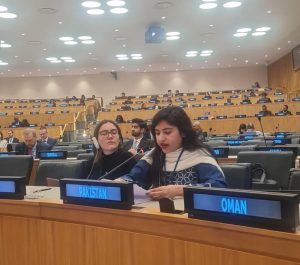Statement by Counsellor Hafiza Humaira Javaid on Agenda Item 18: Sustainable Development (Second Committee)

Thank you for giving me the floor. Pakistan aligns its statement with the statement delivered by Cuba on behalf of G-77 and China.
Mr. Chair,
The 2030 Agenda and its 17 Goals cover the economic, social, and environmental dimensions of the development in a comprehensive and balanced way and provide the blueprint for international development cooperation to address the key economic, governance, and sustainability challenges confronting our world. Today, even though we are at mid-point towards 2030, we are still far away from achieving the SDGs. Developing nations are struggling to achieve notable progress on a wide range of goals and targets due to three principal factors:
One, there is a vast and growing financing gap for developing countries. The financing gap to achieve the SDGs in the South has increased to $4.2 trillion annually; Two, the severe global economic shocks caused by COVID-19 and geopolitical instability have given rise to finance, food and debt crises while reversing the progress towards the SDGs;
And Three, the adverse effects of climate change continue to wreak havoc on the planet, people and their livelihoods. Developing nations are as always disproportionately affected. The Committee’s deliberations this year should, therefore, focus on finding ways and means for achievement of the SDGs.
In this regard, my delegation would like to suggest the following:
First, there is a need to implement all commitments undertaken under Agenda 2030, the Addis Ababa Action Agenda and SDG Summit in particular the UN Secretary General’s “SDG Stimulus”; the early recapitalization of Multilateral Developments Banks; the rechanneling of SDRs; reforming the international financial institutions; and resolving the debt issues.
Second, there should be full implementation of the climate change agenda and climate commitments in accordance with the principles of equity and Common But Differentiated Responsibilities and Respective Capabilities, in light of national circumstances. The pledges made by the developed countries, particularly of US$100 billion in annual climate finance, should be fulfilled and half of this allocated for climate adaptation. The “loss and damage” Fund agreed at COP 27 should be urgently activated and implemented.
Third, the policies of developed nations which contravene their SDG and other commitments need to be reversed. To this end, the international trading system should be restructured to revive export-led growth by developing countries and provide the policy space for industrialization; A Global technology compact, aligned with the SDGs, should be adopted. It should offer preferential access to developing countries to the relevant advanced technologies, build capacity and end discriminatory measures; Developing countries must also be assisted to bridge the “digital divide” through an equitable international information technology regime.
Fourth, to ensure a timely transition to a sustainable global economy, we need to mobilize at least $1 trillion annually as investment in sustainable and resilient infrastructure in developing countries (energy, transport, housing, industry, agriculture).
Thank you!
Sub-Editor: Nosheen